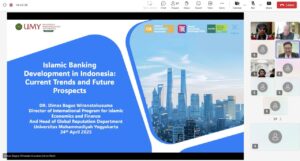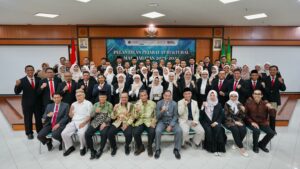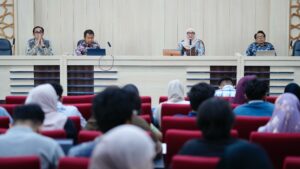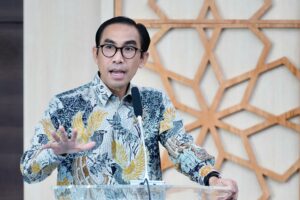Each university may confront various issues with several parties like lecturers. Coping with the issues, the university possesses regulations dealing with lecturers’ code of ethics. For instance, Universitas Muhammadiyah Yogyakarta (UMY) has Assembly of Lecturers’ Code of Ethics (MKED) to handle the lecturers’ issues. This encouraged Universitas Muhammadiyah Surabaya (UM Surabaya) to learn and implement lecturers’ code of ethics at UMY. “The assembly of UM Surabaya was established on 2013 so that we have to learn and learn since we have known yet how to apply the code of ethics. We selected UMY because both UMY and UM Surabaya are private university so that the implementation may not too distinctive,” stated a lecturer of Economic Faculty of UM Surabaya Dr. Didin Fatihudin when asked the objectives of visiting UMY on Tuesday (6/10) at A.R. Fachruddin A, Floor 5, UMY.
MKED is a non-structural body maintained by rector and based on the senate proposal. “MKED generally functions to verify infringements of lecturers’ code ethics, to decide whether or not the violations obviously ensue, and to provide recommendation to rector. The MKED of UMY encompasses 7 people acting as chief, secretary, and members with 4-year length of service. Lecturers’ code of ethics of UMY comprises 12 chapters broken down into articles,” informed Chairman of UMY’s Senate Prof. dr. H Moh. Anwar, M.Med.Sc., Sp.OG (K).
Prof. Anwar mentioned, “The 12 chapters comprise Chapter I general regulations, Chapter II scope, Chapter III lecturers’ ethics toward themselves and their family, Chapter IV lecturers’ ethics toward the university, Chapter V lecturers’ ethics toward other lecturers, staffs, and students, Chapter VI lecturers’ ethics toward themselves, Chapter VII lecturers’ ethics in Muhammadiyah’s life, Chapter VII lecturers’ ethics in social life, Chapter VIII lecturers’ ethics as statehood, Chapter IX lecturers’ obligation toward the implementation of the code of ethics, Chapter X maintenance of the code of ethics, Chapter XI sanction, and Chapter XII closing. The lecturers are required to comprehend and obey the articles which also can be a reference when they break the code of ethics.”
He also elucidated the distinction between private and state universities. “Private universities rarely confront the issues of ethical code infringement, but once they face, it must be a huge issue. On the other hand, state universities overcome the greater number of issues. I argued that the circumstances are dealing with religion. Most of private universities employ religion as the foundation, for instance UMY. Thus, it can be the additional value of this university,” he inserted.
When an issue emerges, MKED of UMY has regulations to cope with it. “When a lecture breaks the code of ethics, the faculty party will investigate him. If it is proven, MKED will investigate him objectively and it should be supported by external proof. Nevertheless, during the investigation, he may defend himself so that MKED will not exclusively blame him. If the proof was gathered, it will be proposed to the rector who has an authority of decision making, yet he will commonly remain conducting meeting to decide,” asserted Prof. Anwar.
Additionally, the visit of UM Surabaya was warmly welcomed by Rector of UMY Prof. Dr. Bamabang Cipto, M.A. He uttered that the visit can reinforce good relationship between both private universities. “May this visit be valuable for both universities. I wish that the knowledge can become a reference for UM Surabaya to apply Lecturers’ Code of Ethics so that the infringement will diminish,” he expected.






